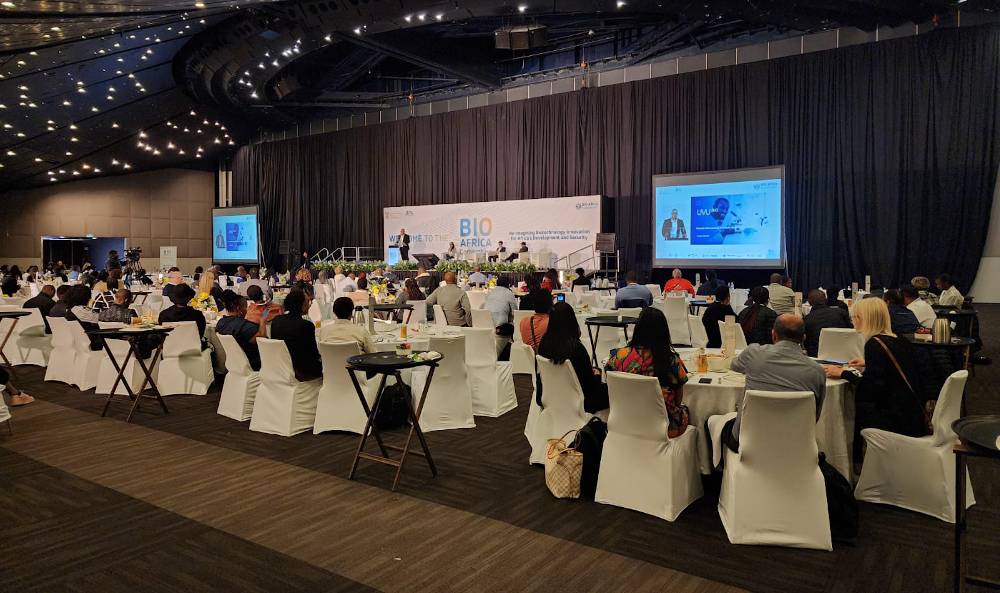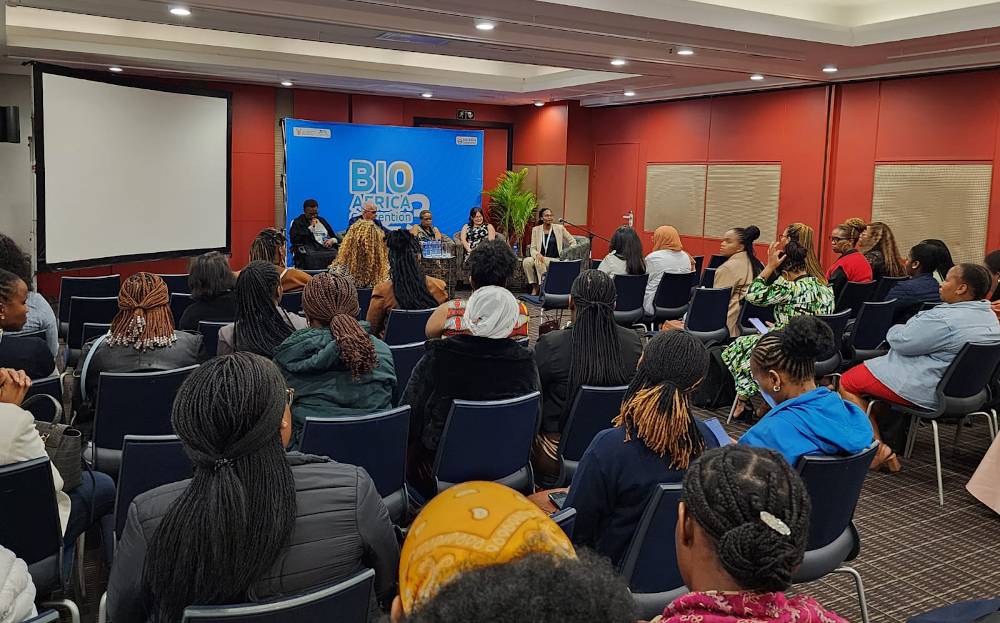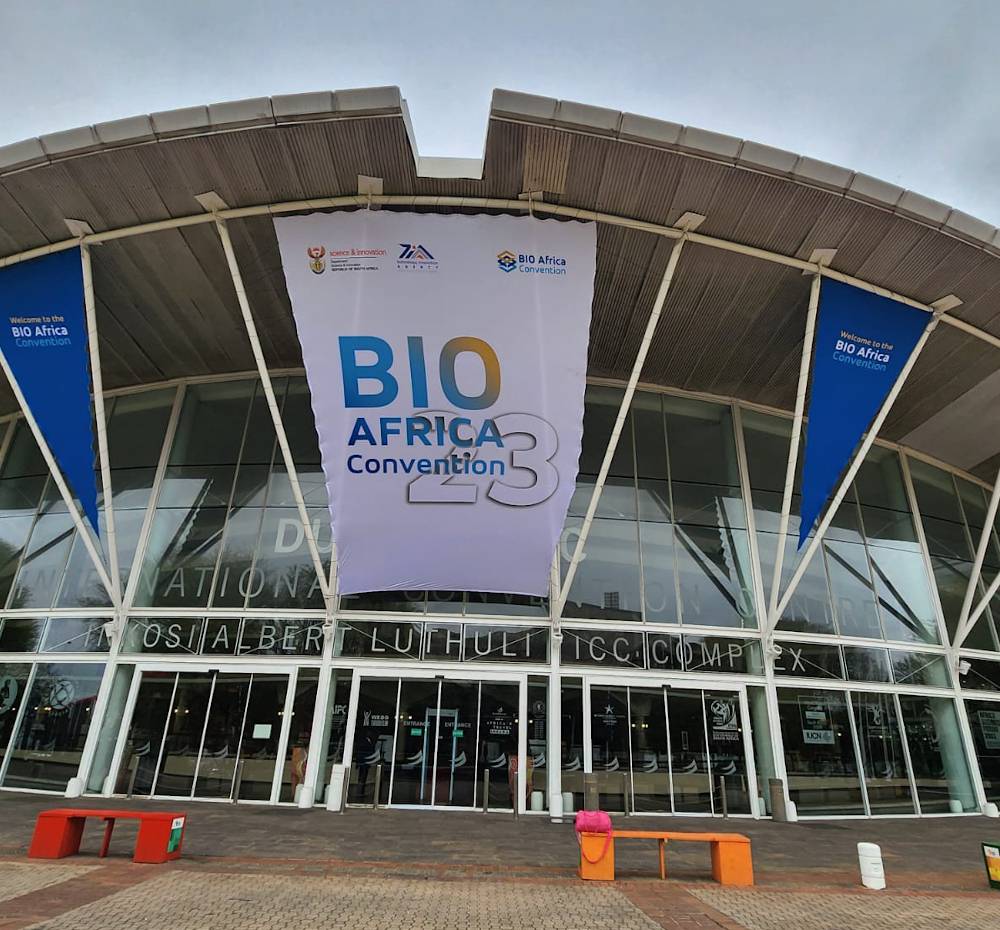Speakers at the BIO Africa Convention address the audience.
Biotech experts, researchers and academics explore ways to boost Africa’s biotech innovations
Judging by the high number of attendees, the level of enthusiasm among the participants and the quality of discussions, this year’s installment of BIO Africa Convention was a resounding success. Held annually since its inception in 2018, the convention brings together industry experts, researchers, academics, policymakers, entrepreneurs and innovators from across the globe. It is considered a premier platform for key stakeholders to network, foster partnerships and to explore growth opportunities within the biotechnology sector in Africa and the world.
Biotechnology innovations
The BIO Africa Convention 2023 took place at the Durban International Convention Centre from 1-6 September. The first days were dedicated to pre-convention, and the main event commenced from 4 to 6 September. The theme of the sixth gathering was: “Re-imagining Biotechnology Innovation for Africa’s Development and Security”. It featured biotechnology innovations in health, agriculture, energy and the entrepreneurial sectors and also included parallel sessions, plenaries and an exhibition that featured 100 exhibitors. Small, medium and micro-enterprises as well as several start-up businesses also formed part of the event.
 The Plenary Start-up Breakfast.
The Plenary Start-up Breakfast.
Relevant and timely
Dr Boitumelo Semete-Makokotlela, a member of the event’s organising committee and the CEO of the South African Health Products Regulatory Authority (SAHPRA), chaired the plenary proceedings. She said the theme of the convention was timely and relevant, as there are pertinent discussions currently taking place around how Africa can boost its security through local vaccine manufacturing.
Dignitaries
Some of the key dignitaries who graced the occasion included: Dr Blade Nzimande, Minister of Higher Education, Science and Technology; Dr Nhlanhla Msomi, AfricaBio Chairman of the Board; Dr Phil Mjwara, Director-General of the Department of Science and Innovation (DSI); and Dr Sanjay Singh, CEO of Gennova Biopharmaceuticals Ltd, India. Nzimande delivered the keynote address.
 The Women’s Healthcare Lunch.
The Women’s Healthcare Lunch.
Start-up Stadium
The Start-up Stadium is one of the event’s most popular and flagship innovations, which was hosted again this year following its success in 2022. It is specifically dedicated to showcase emerging biotech start-ups that have the potential to revolutionise the industry. The platform provides a unique opportunity for the participants to unleash their creativity, innovation and gain unlimited exposure. They had a chance to network with industry specialists and potential investors, and receive valuable feedback from experts in the field. In addition, the initiative aims to forge partnerships and synergies with a view to driving innovation and contribute to Africa’s sustainable development.
The selected start-ups received:
- Free exhibition space in the Start-Up Stadium at the BIO Africa Convention from 4 to 6 September 2023;
- An opportunity to pitch their ideas to an expert panel of judges; and
- The opportunity of winning the AHIA Prize with a value of $10 000 for a pre-revenue start-up.
- Emory University, in partnership with BIO Africa, offers courses to SMMEs and start-ups on topics such as technology transfer and IP training.
Implementing DSI’s Decadal Plan
In his address, Nzimande highlighted the significance of the convention, saying it “provides an opportunity for Africa to talk about its aspirations, opportunities, and vision for a continental bio-economy”. He said South Africa has been grappling with the issue of bio-innovation and his department has been very instrumental through the implementation of its Decadal Plan. He said through the bio-economy strategy, the DSI’s role has been threefold: namely, building strategic innovation competencies, implementing strategic innovation programmes and, promoting awareness, teamwork and cooperation among all stakeholders towards national objectives.
Nzimande said the South African bio-economy is mainly focused on four critical areas: health innovation, agriculture innovation, industrial biotech and indigenous knowledge-based technology innovation.
 BIO Africa 2023 took place at the Durban International Convention Centre.
BIO Africa 2023 took place at the Durban International Convention Centre.
Health innovation
The DSI’s health research, development, innovation and manufacturing interventions are aimed at harnessing their strengths and the opportunities through building strategic partnerships across government, academia and industry. Nzimande noted that due to the magnitude of health challenges facing the country no single institution, intervention or approach will be adequate to address the challenges effectively. “Thus, the achievement of the envisaged health outcomes of the country will require both technological and non-technological innovations,” he added.
Nzimande said the outbreak of the Covid-19 pandemic has shown that South Africa and the rest of the world can no longer depend on a single health system intervention, especially where pandemic preparedness is central.
Agricultural innovation
Nzimande said the Decadal Plan prioritises the revitalisation of traditional sectors of the economy such as agriculture through deployment of bio-innovation products, processes and technological services to support a competitive, productive and modern agricultural sector. It also focuses on, among others, the research, development and innovation (RDI) to drive growth in the sector, development of technologies and innovative solutions. He said not only does this increase productivity and competitiveness but it also provides sustainable service delivery solutions; creation of an inclusive economy and transfer of technologies and knowledge to the poor and the informal economy. All of these are also aligned with the Agriculture and Agro-processing Masterplan led by the Department of Agriculture, Land Reform and Rural Development.
Industrial biotech
At the heart of the sustainable bioeconomy development, said Nzimande, is the concept of an integrated bio-refinery, which uses different biomass feedstocks as a raw material for the production of a spectrum of bio-based products. He said their integrated bio-refinery implementation model targets the full value of the biomass feedstocks, by designing and engineering the facility to rescue the higher value products before the process, to get maximum yield of the lower value products. Nzimande said they envisage that the adoption of an integrated bio-refineries strategy will facilitate the country’s transition from a fossil resource-based industry towards utilisation of sustainable and renewable resources.
Indigenous knowledge-based technology innovation
The indigenous knowledge-based technology innovation directorate, Nzimande said, has been expanding its work for multi-country collaboration with the BRICS countries. He said DSI has speared-headed the establishment of the BRICS Research and Innovation Institute in Natural Medicines to be hosted by South Africa.
It is also supporting the SAHPRA working committee to review the South Africa’s Medicines Regulations for the inclusion of proprietary African natural medicines in the Essential Medicines List. He expressed excitement about the South African scientists from the Universities of Free State and KwaZulu-Natal and senior DSI officials who have been seconded as advisors to the World Health Organization’s African Regional Office (WHO-AFRO).
The DSI leads the research, development and innovation pillar of the Cannabis and Hemp Industrialisation Masterplan. In addition, it is supporting studies on the medical benefits of cannabis in cancer, diabetes, hypertension, long-Covid and neurodegenerative diseases.
— Thabo Mohlala